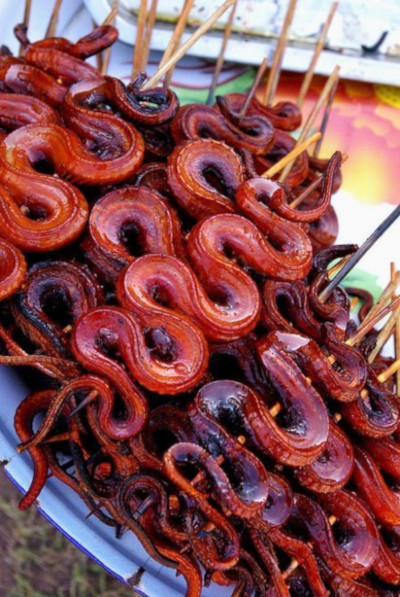The ban also forbids human consumption of many other traditional favourites and regional specialties. It’s all part of an attempt to control the massive Coronavirus outbreak in that country that’s infected more than 82,000 and killed almost 3,000 in the past several weeks…

We learned earlier in the week that the Novel Coronavirus – COVID 19 outbreak in China is now thought to have been tied to the consumption of ‘wild meat’ and Meats that we in the west would consider novelty noshes, or even taboo table fare.
So, city authorities in the southern Chinese tech hub Shenzen have proposed a ban on the human consumption of many meats the Chinese favour. Actually, it’s not so much a ban on some meats, but a regulation that allows consumption of only a few conventional, domestically raised Meats including: Pork, Chicken, Beef, Rabbit, Fish and Seafood, Lamb, Donkey, Duck, Goose and Pigeon.
An official notice posted all across Shenzen City says: “Banning the consumption of wild animals is a common practice in developed countries and is a universal requirement of modern civilization.”
The Shenzen ban follows a national ban on the consumption of wild animal Meats announced this past Monday. Some of the earliest known COVID 19 infections occurred in people who had visited or worked in a Wuhan market that sold Bats, Snakes, Civets, Turtles, Frogs and other wild-caught animals. It’s believed the Coronavirus outbreak originated with Snakes (see photo, above left).
Citizens caught eating protected animals would be fined up to 20,000 yuan ((US)$2,850) and up to 2,000 yuan for non-protected animals covered by the ban, according to the draft Shenzen regulation. Shops serving protected meat face fines of up to 50,000 yuan per violation.
Chinese consumers not happy
Chinese consumers are really missing their specialty Meats, not only as a matter of traditional significance, but because some wild-caught meats are cheaper than domesticated species, which are more expensive to raise due to farm and health regulations.
Perhaps the most visible result of the Shenzen ban is the cancellation of the annual Dog Meat Festival in Yulin, in neighbouring Guangdong Province.
Fallout not all negative
Among the foods the Shenzen Ban makes illegal are Cat and Dog, considered delicacies in many parts of China.
“Although the trade in Shenzhen is fairly small compared with the rest of [Guangdong] province, Shenzhen is still a huge city and is larger than Wuhan, so this would be very significant and could even have a domino effect with other cities following,” Humane Society International’s China Policy Expert, Peter Li.
My take…
There are times of the year when Chinese scientists appear in the learned scientific journals every month. Their study reports almost exclusively deal with new discoveries in Rice culture or improving disease resistance or yields for other vital crops. China is in the unenviable position of being having the largest population of any country in the world, and must press forward with research which will enable it to feed its growing population in the food challenged future.
The main problem there is not changing what their people eat, but in providing enough of the basic Chinese dietary staples to feed them all. And it’s a problem even now. Which may explain why the government has only recently outlawed the human consumption of ‘wild’ and other non-domesticated meats. Without them, some people, particularly in remote corners of China, might already be starving.
Aren’t you glad you live in a civilized, developed country?
~ Maggie J.

